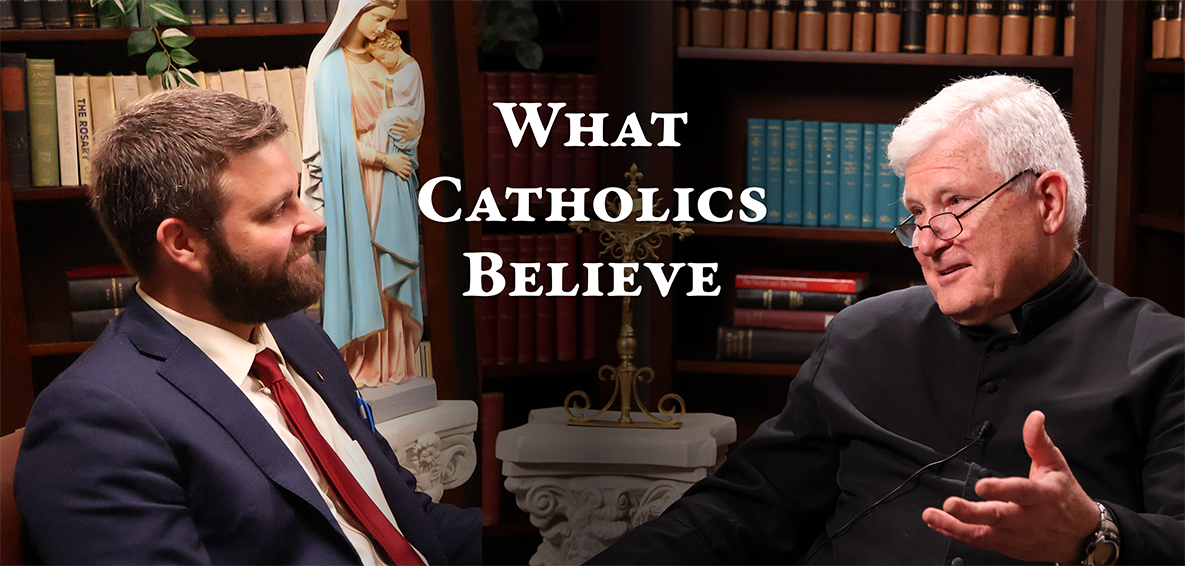The Deposit of Faith

Catholics believe that the truths of Divine Revelation are preserved for us in the twin fonts of Sacred Scripture and Sacred Tradition – both of which come to us from the Church established by Christ, the Catholic Church. Martin Luther rejected the Church and her Tradition, and insisted that all divinely revealed truth is contained in Scripture alone ("sola scriptura") and that the Bible is sufficient unto itself for the salvation of men. Luther falsely claimed to derive from the Bible his other teachings: man is saved by faith alone, man is saved by grace alone, and the Bible is subject to private interpretation only (since there is no church with authority to interpret the true meaning of the Bible for everyone). The fact that Luther’s teachings – beginning with that of "Scripture alone" – are false is clear for numerous reasons:
(1) Nowhere in the Bible do the Sacred Scriptures themselves ever claim to contain all of Divine Revelation.
(2) In fact, the Scriptures attest that they do not contain all that God has revealed to mankind. For example:
- The last verse of Saint John’s Gospel: "But there are also many other things which Jesus did; which, if they were written every one, the world itself, I think, would not be able to contain the books that should be written."
- The first chapter of The Acts of the Apostles says that Christ spent 40 days between His Resurrection and His Ascension teaching the Apostles about "the kingdom of God." Yet, only in St. John’s Gospel do we find any of those teachings recorded – and those very teachings Protestants reject (!): Christ giving to the Church the power to forgive sins and Christ giving to St. Peter the role of Supreme Pastor.
(3) Christ Himself never wrote any book of Scripture; in fact, the only scriptural reference we have concerning Our Lord writing anything refers to Christ "drawing" in the dust when the Pharisees brought to Him the woman caught in adultery.
(4) Christ never commanded His Apostles to write; His command to them was this: "Go ye into the whole world, and preach the Gospel... ." (St. Mark 16, 15)
(5) The Church came first! Before any book of the New Testament was written, the Church was established by explicit command of Christ Himself. The Church existed an entire generation before the first Gospel (St. Matthew) was written down, and fully two generations before the writing of the fourth Gospel (St. John).
(6) The Church did not come from the Scriptures; rather, the Church came directly from Christ, and the Scriptures came from the Church.
(7) For centuries after Christ’s Ascension, the vast majority of mankind could not read at all (the artwork decorating the churches served as the people’s "picture Bible").
(8) For centuries after Christ’s Ascension, the Gospels were translated into only a few languages.
(9) Until the invention of the printing press in the late 15th Century, books had to be copied slowly and laboriously by hand and thus they were rare and costly; few could have them. (Thus, Bibles would be chained in the churches.)
(10) The very existence of the Scriptures requires an authority (i.e. the Church established by Christ) to decide and guarantee:
(a) which of all the many ancient writings are in fact inspired by God, and thus belong in the Bible;
(b) whether translations into all the different languages are accurate;
(c) and what is the true meaning and interpretation of the words of Sacred Scripture (see 2 Peter 1:20-21).

